Katrin Silva grew up riding dressage in Germany before moving to the United States at age 19 to learn to ride Western. She’s been riding both disciplines for the last twenty years. Read her article on Contact here.
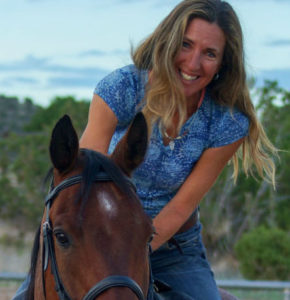 Silva has competed successfully through fourth level dressage on quarter horses, Morgans, Arabians, Hanoverians, and many other breeds. Based in New Mexico, she enjoys improving horse-rider partnerships and firmly believes that good riding is always good riding, no matter which type of tack a horse is wearing. Check out her blog here.
Silva has competed successfully through fourth level dressage on quarter horses, Morgans, Arabians, Hanoverians, and many other breeds. Based in New Mexico, she enjoys improving horse-rider partnerships and firmly believes that good riding is always good riding, no matter which type of tack a horse is wearing. Check out her blog here.
Katrin Silva writes:
I am a professional horsewoman. My job description, as I understand it, is simple:
- To help every horse to become a more balanced, more confident, more willing athlete.
- To help these horses and owners get along better.
- To improve these horses’ lives.
A few of my current projects:
-
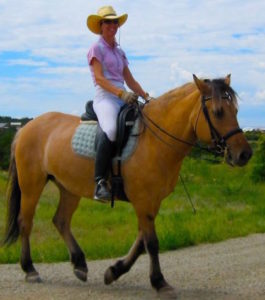
The little Fjord
Lily, the little fjord who could.
- A 13 year-old Arabian with no right lead and a very tense back.
- A five year-old Quarter Horse born and bred for reining, pushed too hard too early, and then sent home.
- An opinionated three-year old mare with overactive hormones.
- An off-the-track Thoroughbred who has trouble negotiating steering a 30-meter circle, never mind a 20-meter one.
- A 17 year-old “difficult” mare mostly out to pasture for the last decade.
When I meet a horse, I ask myself:
How can I help this horse become a better partner for its human?
How can I help this rider better understand her horse?
How can I help them communicate?
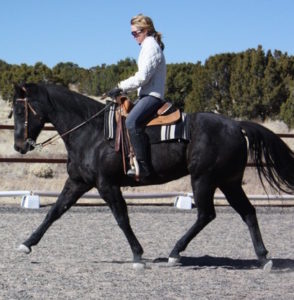
Horses can be incredible teachers
I reach into my toolbox for the skills I have developed over the years – as a dressage rider, as a cowgirl, as a colt breaker, as a trainer of problem horses. Most of the time, I can offer something useful.
Over the years, I have noticed that many riders – professionals and amateurs – use a different approach. Consciously or not, they evaluate a horse along the lines of:
- What can this horse do for me?
- How can this horse improve my career?
- How great can this horse make me look in the show ring, or on the trail in front of my friends?
If the horse comes with challenges that hamper its ability to boost the humans’ ego, riders won’t spend the months or years of patient, dedicated training that may well transform a horse into a willing, athletic riding partner.
This unfortunate attitude is common across most equestrian disciplines. Show jumpers, dressage riders, endurance aficionados, competitors in ranch horse or cow horse classes all tend to put more time and effort into horses who will make them look good.
There is nothing wrong with wanting to compete on a horse who has a chance of doing well. It would be professional suicide to think otherwise.
But riders also need to work with horses who might never be great.
Why?
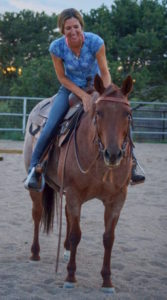 Spending time and energy on horses with issues is the right thing to do for the horse. Without a solid education, a horse’s prospects in life become dire. Many horses without much obvious talent, or horses with conformational problems, or horses with a complicated personality will have a hard time finding happy, long-term homes with owners who understand and appreciate them.
Spending time and energy on horses with issues is the right thing to do for the horse. Without a solid education, a horse’s prospects in life become dire. Many horses without much obvious talent, or horses with conformational problems, or horses with a complicated personality will have a hard time finding happy, long-term homes with owners who understand and appreciate them.
A well-trained, rideable horse, even if it’s never going to win any ribbons, has a much better outlook. If good riders won’t work with disadvantaged horses, what chance do they have?
Helping “problem” horses evolve into the best version of themselves is rewarding, sometimes more so than working with the horses everyone expects to be the next champion. Often they surprise us. That 17 year-old problem mare, pronounced untalented and not worth training, recently earned her first blue ribbon.
Even the horses who don’t turn into superstars are worth every minute I invest in them. Why? Ultimately, they make me a better horsewoman, a better trainer, a better human. They make me rethink and reevaluate what I know. They keep me looking for answers.
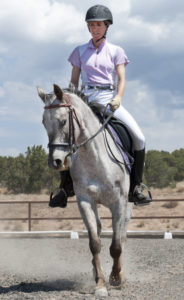
A rescue pony, looking good!
The horses I work with, especially the complicated ones, are my zen masters. They keep me from becoming smug and self-satisfied. They make me question everything I thought I knew. They push me beyond my comfort zone. They keep me honest. They’re the reason I love what I do.
The next time you get the chance to work with a challenging horse who may never excel in your chosen discipline, consider saying “Yes!”
Don’t ask what she can do for you. Ask what you can do for her. If you can help the horse, chances are she’ll return the favor. And then some.